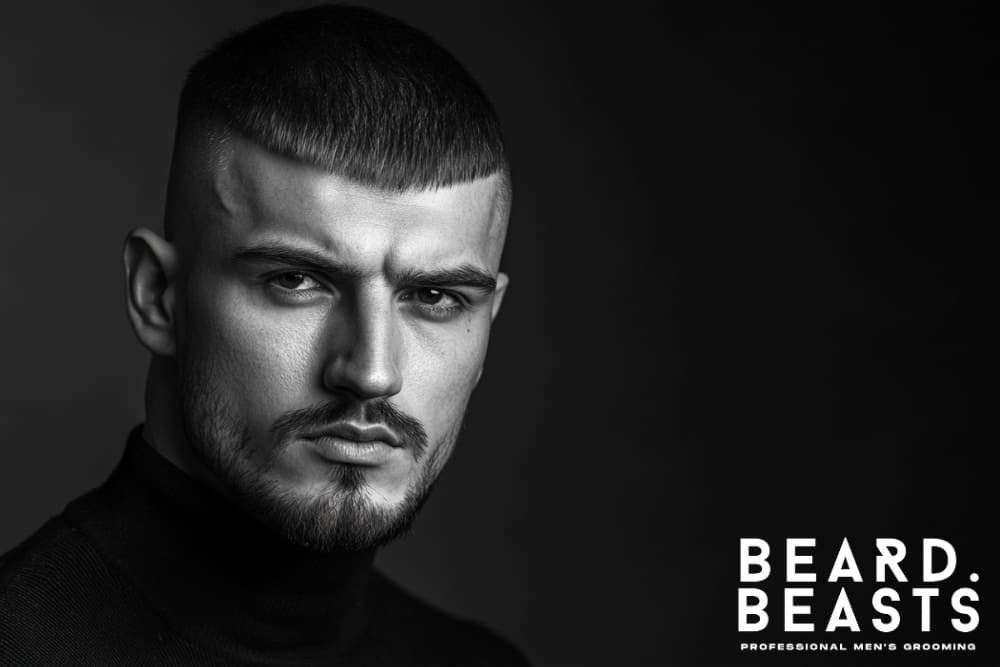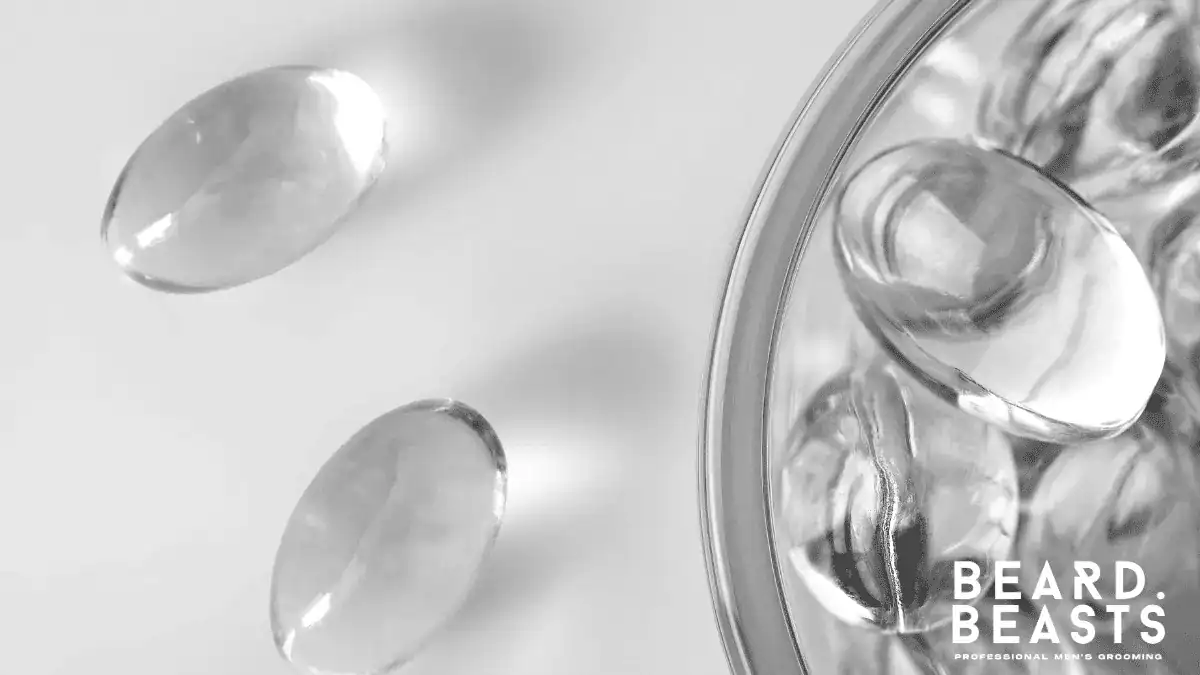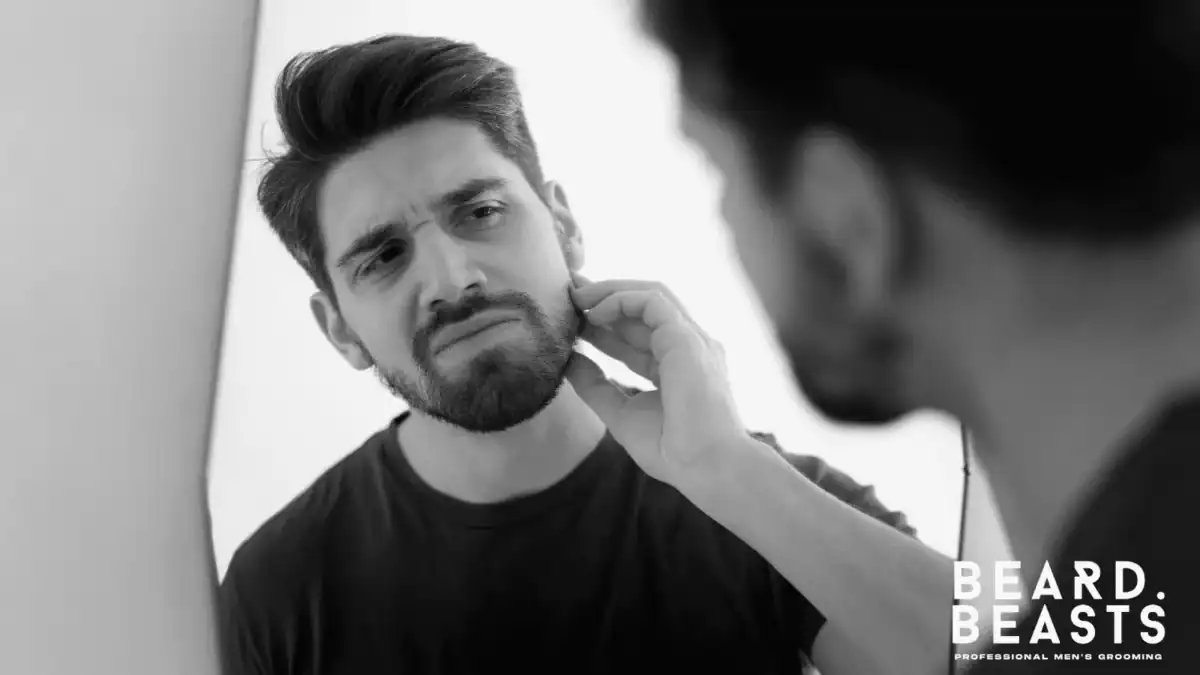Frustrated by slow beard growth? You’re in good company. While genetics do play a role, they’re not the whole story. Your hormonal balance, diet, and even daily stress levels can significantly impact your beard’s progress.
This guide dives into the common, often-overlooked causes of slow beard growth and provides practical, natural strategies to help you cultivate the fuller, healthier beard you desire.
The Science Behind Beard Growth
Understanding the science of slow beard growth can empower you to maximize your beard’s potential. It’s a complex interplay of hormones, genetics, and hair follicle activity.

How Facial Hair Grows: More Than Just Hair
Beard hair, like scalp hair, grows from hair follicles in the skin. But facial hair is androgenic hair, meaning its growth is driven by “male” hormones (androgens).
These hormones determine your beard’s starting point, thickness, and overall growth rate. They are the reason why beard growth typically begins during puberty.
Testosterone and DHT: The Beard’s Power Source
Two key androgens control beard growth:
Testosterone: Priming the Follicles
This hormone primes the facial hair follicles for growth, setting the stage for beard development. Higher testosterone levels are generally associated with a greater potential for a full, thick beard.
Dihydrotestosterone (DHT): The Growth Driver
A more potent derivative of testosterone, DHT directly stimulates the hair follicles, encouraging thicker, faster beard growth. It’s the primary driver of beard hair development. Note: High DHT sensitivity can contribute to scalp hair loss in some men who are genetically predisposed.
If your body produces lower levels of these hormones, you might experience slow beard growth or patchiness. However, even with optimal hormone levels, genetics play a significant role in determining your beard’s destiny.
Genetics: Your Beard’s Blueprint
Your genetic inheritance is a major factor in your beard’s density (how many hair follicles you have), the thickness of each individual hair, your beard’s growth rate, and even its unique growth pattern. If thick, full beards are common in your family, you’re more likely to inherit that trait.
Conversely, if slow beard growth or patchiness is prevalent among your male relatives, you might face similar challenges.
But here’s the key takeaway: even if your genetics aren’t ideal for beard growth, you’re not simply stuck. Optimizing your lifestyle, including nutrition and stress management, and implementing a proper beard care routine can significantly improve your beard’s growth, allowing you to reach your fullest potential.
By understanding these key factors, you can take a more informed and proactive approach to overcoming slow beard growth.
Common Causes of Slow Beard Growth
If your beard is growing slower than you’d like or appears patchy, several factors could be at play. While genetics are a primary determinant, hormonal imbalances, poor nutrition, and lifestyle choices can significantly impact your beard’s progress.
Identifying these causes is the first step to understanding why your facial hair might not be developing as expected.

Genetic Predisposition
Your genetic makeup plays a crucial role in your beard’s growth potential. It determines the number of hair follicles on your face, the thickness of each hair, and the overall speed of growth.
Some men are genetically predisposed to thick, fast-growing beards, while others naturally experience slower development due to inherited traits. If your father or grandfather struggled to grow a full beard, you might face similar challenges.
Hormonal Imbalances
Beard growth is largely driven by two key hormones: testosterone and DHT (dihydrotestosterone).
Low Testosterone
Testosterone primes the hair follicles for growth. Lower-than-optimal testosterone levels can lead to slower beard development and a thinner appearance.
Low DHT
DHT is a more potent derivative of testosterone that directly stimulates hair follicles. Since DHT plays a critical role in follicle activation, men with lower DHT levels might experience patchy or weak beard growth, even with adequate testosterone.
Hormonal imbalances can be influenced by age, underlying medical conditions, and certain lifestyle factors.
Nutritional Deficiencies
Hair growth, including beard growth, relies on a steady supply of essential nutrients. Deficiencies in your diet can significantly impact your beard’s health and growth rate.
A diet lacking these nutrients can weaken hair follicles, slow the production of new hairs, and cause existing beard hairs to become brittle or fall out more easily.
Stress and High Cortisol
Chronic stress takes a toll on your body, and your beard is no exception. Prolonged stress elevates cortisol levels, which can negatively impact testosterone production. Since testosterone is essential for beard growth, high cortisol can disrupt the growth cycle and slow down hair development.
Stress also contributes to inflammation, potentially weakening hair follicles and reducing blood circulation to the beard area.
Poor Beard Care Habits
Neglecting your beard’s hygiene can hinder its growth.
Common Mistakes that Impede Beard Growth
- Dirt and Oil Buildup: Clogs follicles, preventing new hair growth.
- Harsh Products: Strip natural oils, leading to dryness and irritation.
- Over-Washing: Removes protective oils, making hair brittle.
- Lack of Moisturization: Causes dryness, itchiness, and weakened hair.
Without proper care, beard growth can slow, and the hair may appear thinner or less healthy.
Poor Blood Circulation
Healthy hair follicles depend on a rich supply of oxygen and nutrients delivered through the bloodstream. Poor circulation can deprive the beard area of these essentials, leading to weaker follicles and slower growth.
A sedentary lifestyle, smoking, and even chronic stress can all restrict blood flow, limiting the delivery of vital nutrients to hair follicles.
Sleep Deprivation
Quality sleep is crucial for overall health, and that includes your beard. Testosterone production peaks during deep sleep, making rest essential for healthy beard growth. Poor sleep quality reduces testosterone levels and hinders your body’s ability to repair and regenerate, including hair follicles.
Furthermore, sleep deprivation increases cortisol production, further inhibiting testosterone function and slowing beard growth.
Smoking and Excessive Alcohol Consumption
Both smoking and excessive alcohol intake can significantly impede beard growth.
The Negative Impact of Smoking
Smoking restricts blood circulation, reducing the flow of oxygen and nutrients to hair follicles. It also increases oxidative stress, which damages hair and slows growth.
The Detrimental Effects of Alcohol
Excessive alcohol consumption disrupts hormonal balance by lowering testosterone levels. It can also lead to dehydration, making beard hairs brittle and weak, and interfere with nutrient absorption.
While you can’t change your genetics, understanding these other contributing factors to slow beard growth empowers you to make informed choices that support healthier and fuller facial hair development.
How to Encourage Beard Growth Naturally
While genetics play a significant role in determining your beard’s destiny, you’re not just a passive observer. There are several natural ways to actively encourage the thickness, density, and speed of your facial hair growth.
By optimizing your diet, boosting testosterone levels naturally, maintaining a proper grooming routine, and stimulating dormant hair follicles, you can significantly contribute to a healthier and fuller beard.
Optimize Your Diet and Nutrition

A nutrient-rich diet is the foundation of healthy beard growth. Hair follicles require specific vitamins, minerals, and macronutrients to function optimally. Deficiencies can significantly slow down beard development.
Key Nutrients for Beard Growth
- Protein: Hair is primarily composed of protein, making it essential for growth.
- Biotin: A B-vitamin that aids in keratin production, the main structural component of hair.
- Zinc: Crucial for hair tissue growth and repair.
- Vitamin D: Plays a role in creating new hair follicles.
- Omega-3 Fatty Acids: Reduce inflammation and nourish hair follicles, promoting healthy growth.
- Iron: Helps red blood cells carry oxygen to hair follicles.
Foods to Incorporate for a Beard-Boosting Diet
- Eggs: Packed with biotin and protein.
- Fatty Fish (Salmon, Sardines, Mackerel): Excellent sources of omega-3s and vitamin D.
- Lean Meats and Poultry: Provide high-quality protein and iron.
- Nuts and Seeds (Almonds, Walnuts, Chia Seeds): Rich in zinc, biotin, and healthy fats.
- Leafy Greens (Spinach, Kale): Good sources of iron and help regulate testosterone.
Eating a well-balanced diet ensures your beard follicles receive the nourishment they need to function optimally.
Boost Testosterone Naturally Through Exercise
Regular exercise, particularly strength training and high-intensity interval training (HIIT), can naturally increase testosterone levels. Since testosterone plays a vital role in beard growth, this can positively impact your facial hair development.
Best Exercises for Testosterone
- Compound Weightlifting: Squats, deadlifts, bench presses, and overhead presses are highly effective.
- HIIT: Short bursts of intense exercise followed by brief recovery periods.

Cardiovascular exercise, like running or cycling, also supports healthy circulation, ensuring your hair follicles receive ample oxygen and nutrients. An active lifestyle not only benefits your overall health but also creates an optimal environment for a thicker, fuller beard.
Upgrade Your Beard Care Routine
Proper beard maintenance is crucial for encouraging growth and preventing issues that can hinder progress.
Essential Beard Care Practices
- Beard Oil: A quality beard oil hydrates the skin underneath and softens beard hairs, preventing breakage and promoting healthy growth. Apply daily after showering.
- Beard Balm: Provides extra moisture and a light hold, helping to shape and condition the beard. Use as needed for styling and extra conditioning.
- Beard Wash: Use a specialized beard wash 2-3 times a week to cleanse without stripping away natural oils.
- Exfoliation: Gently exfoliate the skin under your beard 1-2 times a week to remove dead skin cells that can clog follicles and impede growth. Use a gentle facial scrub or a soft-bristled brush.
Maintaining a clean, well-hydrated beard creates an environment where new hairs can grow in strong and healthy.
Advanced Techniques: Microneedling and Natural DHT Boosters
For those struggling with patchy or slow beard growth, these techniques can offer additional support.
Microneedling: Stimulating Dormant Follicles
This process involves using a dermaroller with fine needles (typically 0.5mm for beard growth) to create tiny micro-injuries in the skin. This stimulates blood circulation, increases nutrient delivery, and triggers the body’s natural healing response, potentially activating dormant hair follicles.
Use once or twice a week, following proper sanitization and aftercare instructions.
Natural DHT Boosters: Supporting Hormone Balance
Certain natural supplements may help enhance beard growth by supporting healthy DHT levels. Some popular options include:
- Ashwagandha: An adaptogenic herb that may help regulate hormone levels.
- Fenugreek: May increase free testosterone levels.
- Saw Palmetto: May inhibit the conversion of testosterone to a form that contributes to hair loss, thus indirectly supporting beard growth.
Important Note: Consult with a doctor or dermatologist before starting microneedling or any new supplements, especially if you have underlying health conditions or are taking medications.
Patience and Consistency: The Keys to Beard Success
Growing a beard is a journey, not a sprint. Beard growth varies significantly from person to person, and it can take months, or even years, to achieve your desired thickness and length. Many men give up too early, mistakenly believing they can’t grow a full beard when, in reality, their hair simply needs more time to develop.
By sticking to a consistent grooming routine, maintaining a healthy diet, exercising regularly, and potentially incorporating advanced techniques, you’ll see the best long-term results. Even if progress seems slow, remember that patience and persistence are essential for achieving your ideal beard.
When to See a Professional for Slow Beard Growth
While slow beard growth is often influenced by genetics, lifestyle, and hormone levels, underlying medical conditions can also be a factor. If your beard growth is unusually slow, patchy, or suddenly worsens, consulting a healthcare professional is a wise step to rule out potential health issues.
Medical Conditions That Can Impact Beard Growth
Certain health conditions can directly affect hair follicle function, leading to thinner, weaker, or patchy facial hair.
Common Medical Conditions to Consider
- Alopecia Areata: An autoimmune disorder where the body attacks its own hair follicles. This can result in patchy hair loss on the beard, scalp, and other areas.
- Thyroid Disorders:
- Hypothyroidism (Underactive Thyroid): A condition where the thyroid gland doesn’t produce enough hormones. This can weaken hair follicles, leading to slow, brittle, or thinning beard growth.
- Hyperthyroidism (Overactive Thyroid): While less common, an overactive thyroid can also disrupt hair growth cycles, causing increased shedding and difficulty maintaining a full beard.
- Testosterone Deficiency: Low testosterone or impaired conversion to DHT can significantly slow beard growth or prevent facial hair from developing fully.
- Skin Conditions: Chronic dandruff, fungal infections, or seborrheic dermatitis can irritate the skin and impede healthy hair growth.
If you suspect a medical condition is affecting your beard growth, a doctor can properly diagnose the issue and recommend appropriate treatment options.
When to Consult a Doctor for Hormone Testing
As we have mentioned, Testosterone and DHT are crucial for beard growth. Therefore, hormonal imbalances can play a major role in slow beard growth or patchiness. In addition to slow beard growth, if you experience any of the following symptoms, consider consulting a doctor for hormone testing:
Symptoms That May Indicate a Hormone Imbalance
- Low energy or chronic fatigue
- Loss of muscle mass
- Unexplained weight gain
- Decreased libido
- Mood changes, depression, or difficulty concentrating
Blood tests can measure your testosterone, DHT, thyroid hormone levels, and vitamin levels. These tests help determine if a deficiency or imbalance is contributing to your slow beard growth. Based on the results, a doctor may recommend medical treatments, such as hormone replacement therapy, or suggest lifestyle changes to help restore balance and support healthier facial hair growth.
Don’t Hesitate to Seek Professional Advice
If your beard growth seems abnormally slow, is patchy in specific areas, or has noticeably worsened, seeking professional advice is crucial. A healthcare professional can provide valuable insights, accurate diagnosis, and potential solutions to help you achieve a fuller, healthier beard. They can also determine if seeing a specialist, such as a dermatologist or endocrinologist is necessary.
Conclusion: Overcoming Slow Beard Growth
Dealing with slow beard growth can be discouraging, but remember that you have more control than you might think. While genetics play a role, your hormones, nutrition, lifestyle, and grooming habits significantly impact your beard’s progress.
This guide has equipped you with the knowledge to take action. Prioritize a balanced diet, regular exercise, and quality sleep to support healthy testosterone and DHT levels. Implement a consistent beard care routine that includes cleansing, moisturizing, and exfoliating. If needed, explore options like microneedling and natural DHT boosters under professional guidance. And if you have concerns, don’t hesitate to consult a healthcare professional.
Ultimately, overcoming slow beard growth is a journey that requires patience and consistency. By making sustainable lifestyle changes and following a dedicated grooming routine, you can significantly improve your beard’s health and growth potential. Embrace the process, stay committed, and you’ll be well on your way to achieving the thicker, fuller beard you’ve always desired.





